Suzanne Stengl's Blog, page 13
December 23, 2014
10 of My Favourite Christmas Quotes

Tomorrow is Christmas Eve and the weather office is suggesting a 40% chance of flurries late in the day. There’s still snow on the ground from previous storms, especially on the north side of buildings, but a new snowfall would be extra nice for a White Christmas.
This year, I am mostly ready for the celebration — turkey thawing in the fridge, all the groceries bought and stowed.
We don’t do a lot of presents but we have some token ones under the tree. And we have lots of Christmas cards. The best part, of course, is sitting down to dinner with family.
Here are 10 of my favourite Christmas quotes. Do you have any favourites that sum up the season for you?
“I will honor Christmas in my heart, and try to keep it all the year.”
— Charles Dickens, A CHRISTMAS CAROL
Christmas isn’t a season. It’s a feeling.
— Edna Ferber
Strange, isn’t it? Each man’s life touches so many other lives. When he isn’t around he leaves an awful hole, doesn’t he?
— Clarence, in IT’S A WONDERFUL LIFE
“Then the Grinch thought of something he hadn’t before! What if Christmas, he thought, doesn’t come from a store. What if Christmas . . . perhaps . . . means a little bit more!”
— Dr. Seuss, HOW THE GRINCH STOLE CHRISTMAS!
Do give books – religious or otherwise – for Christmas. They’re never fattening, seldom sinful, and permanently personal.
—Lenore Hershey
“One can never have enough socks,” said Dumbledore. “Another Christmas has come and gone and I didn’t get a single pair. People will insist on giving me books.”
— J.K. Rowling, HARRY POTTER AND THE SORCERER’S STONE
A lovely thing about Christmas is that it’s compulsory, like a thunderstorm, and we all go through it together.
— Garrison Keillor
I had rather have a fool to make me merry than experience to make me sad.
— William Shakespeare
“It’s Christmas Eve! It’s… it’s the one night of the year when we all act a little nicer, we … we … we smile a little easier, we … w-w-we … we … we cheer a little more. For a couple of hours out of the whole year, we are the people that we always hoped we would be!
—Frank Cross, in SCROOGED
Have yourself a merry little Christmas.
— Ralph Blane and Hugh Martin
Image from bigstockphoto.com #53959294
The post 10 of My Favourite Christmas Quotes appeared first on Suzanne Stengl.
December 16, 2014
Laughter
 “There is nothing in the world so irresistibly contagious as laughter and good humor.” — Charles Dickens, A Christmas Carol
“There is nothing in the world so irresistibly contagious as laughter and good humor.” — Charles Dickens, A Christmas Carol
We all know that laughter is good for us. Now there are scientific studies that say the same thing. Dr. Mel Borins of the University of Toronto tells us: Laughing seems to help strengthen your immune system to fight off colds and sickness, and lowers activity in the “stress” areas of the brain. Read the full article: A belly laugh will do you a world of good
And for a good laugh you might like this—especially if you’re like most people and fall somewhere on the ADD continuum. For the ADD version of The Night Before Christmas, go here.
In all the hustle and bustle of pre-Xmas, stop and laugh whenever possible. And remember what Robert Frost said:
“If we couldn’t laugh we would all go insane.”
Image from istockphoto.com # 000017232698
The post Laughter appeared first on Suzanne Stengl.
December 9, 2014
Christmas in Connecticut
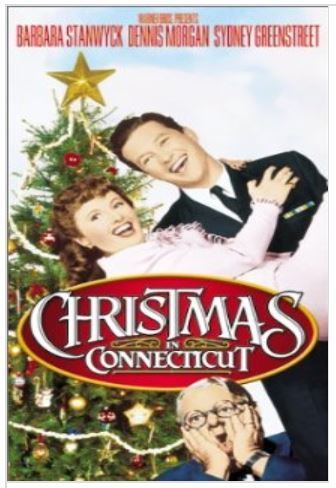 Rolf found this movie at the library. He’d heard it was coming out in the Blu Ray version so he wanted to see if it was worth adding to his Christmas collection.
Rolf found this movie at the library. He’d heard it was coming out in the Blu Ray version so he wanted to see if it was worth adding to his Christmas collection.
The movie was made in 1945, a time of rotary phones and lots of smoking. Patients even smoked in the hospital, but only the men. Funny how those things stand out now. And I wonder, does everyone even know what a rotary phone is? But let me tell you about the premise.
Elizabeth Lane is a writer with a housekeeping column for a prestigious magazine. In her column, she not only writes about her excellent recipes but she also tells about her idyllic life on the farm in Connecticut with her husband and baby.
Of course, it’s all fiction. She is supporting herself with the lies she writes about. As any fiction writer does. And she is doing well, well enough to afford a mink coat.
This Cinderella has a fairy godfather in the person of Uncle Felix – a chef from Budapest who now runs Felix’s Restaurant in America. Elizabeth gets her recipes from him, and he is very protective of her. He is also full of witticisms like “Nobody needs a mink coat but a mink.” He may have been an early proponent of the anti-fur movement.
As long as the public goes on thinking the Connecticut farm myth is true, all is well.
The film starts off with the sinking of a ship in WWII, and two survivors in a lifeboat. One of them dreams of eating wonderful food in a five star restaurant. Finally they are rescued, and the hero, Jefferson Jones, is put on a soft diet since he’s been starving for eighteen days. His sailor friend suggests he woo a nurse to get more substantial food. He goes so far as to propose to the nurse, who is the cliché dumb blonde.
Much of the film is clichés but look beyond that. At any rate, blondie decides it would be a good idea for Jeff to experience life in a real home, so that he will realize what a good thing a home is, and then he will marry her. So she writes to Mr. Yardley, the owner of Elizabeth’s magazine. The nurse had taken care of Mr. Yardley’s little granddaughter, nursing the child back to health after a bout of the measles.
Remember measles? And now we have the MMR vaccine. I grew up without the vaccine and experienced measles in full force. But I digress.
The nurse asks Mr. Yardley to arrange for Jeff, the war hero, to spend Christmas at Elizabeth Lane’s farm.
Elizabeth’s editor Dudley is distressed. If the owner Yardley discovers she is a sham, not only will Elizabeth lose her job, but so will Dudley.
The gig is up. Elizabeth is at Uncle Felix’s restaurant, lamenting, “Where will I get a farm? I don’t even have a window box?”
Enter John Sloan, the architect, the man who owns the farm which provides the inspiration for the fictional Elizabeth, and the man who wants to marry her.
“You know you need someone to look after you,” he tells her. She always refuses since she does not love him. He says she will learn to love him, and since she will no longer have a job, now she can’t say her career is the reason. Out of excuses, she agrees to marry him.
Felix thinks this is a catastrophe.
Now Elizabeth must confess to Yardley that her column is fiction.
Yardley is overpowering and won’t let her get a word in. (Later, at the close of the story, she will make herself heard.)
For now, he tells her that her column is the only one he actually reads and that circulation will benefit if she entertains this American hero by inviting him to the perfect Christmas on the perfect farm. In fact, since Mr. Yardley’s daughter and granddaughter are busy elsewhere working for the war effort, he will attend himself. And the magazine will pay her a bonus.
For Elizabeth, the deciding factor is that her editor will not lose his job, and his children will be able to have presents this Christmas.
At the first turning point, thirty minutes into the film, Elizabeth has decided to get married and the Judge will perform the ceremony as soon as they arrive at the farm. Elizabeth has also convinced Sloan to continue the masquerade with Mr. Yardley and the sailor in order to save her editor’s job.
Now she has a farm and a “husband” and he, as a man with an eye for detail, has even provided the “baby”. His Irish housekeeper Nora watches the baby for a woman who works at the factory. (This is wartime and women worked at the factories.)
It’s apparent this will not be a match made in heaven. Sloan is more interested in his architectural design and loves to talk about it. At any time.
“When you’re kissing me don’t talk about plumbing,” Elizabeth tells him, hopefully. He asks what he should talk about. She suggests maybe he shouldn’t talk.
Felix accompanies Elizabeth to the farm. A bit of rivalry sets up in the kitchen. Nora the housekeeper is quite happy with her Irish Stew. Felix adds paprika. Now it is goulash.
Sloan is anxious to get the ceremony over with. Felix stalls, claiming they need music. And sure enough the sailor shows up two hours early.
The ceremony keeps getting interrupted as Elizabeth and Jeff get to know each other. He tells her she is “the swellest person I ever met”. I love these out-of-date lines.
And of course Jeff is our hero so he would never kiss a married woman.
The movie is full of clichés, but they seem to work in this 1945 setting. Perhaps this is where the clichés originally came from. Regardless, this is a movie of traditional Christmas charm right down to the horse drawn sleighs.
Felix is delightful. Elizabeth is a woman ahead of her time, although after finding true love, it seems she will quit her job. I will pretend that after the credits roll that does not happen and she still gets to write.
Have you watched this movie? What did you think? Have you ever had the measles?
Image from imdb.com
The post Christmas in Connecticut appeared first on Suzanne Stengl.
December 2, 2014
Ghostly Treasure – Free for Five Days!

A Christmas gift for you.
A BUCKET LIST. A CHALLENGE. A GHOST. The missing piece? TREASURE!
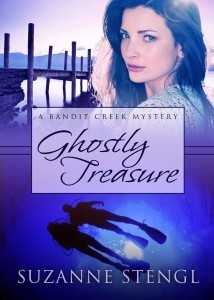 Even though Lost Lake is renowned for claiming the lives of divers searching for the legendary gold buried in its depths, Christie McFee is determined to explore the Lake’s underwater ghost town. And when a ghost from the past convinces her to join the treasure hunt, she throws her usual caution overboard.
Even though Lost Lake is renowned for claiming the lives of divers searching for the legendary gold buried in its depths, Christie McFee is determined to explore the Lake’s underwater ghost town. And when a ghost from the past convinces her to join the treasure hunt, she throws her usual caution overboard.
Sure that the talk of ghosts is strictly for tourists, Gaven St. Michel, local Divemaster, is confident he can keep Christie’s lovely body from being added to the Lake’s count—until another ghost appears amid the watery graves in Bandit Creek.
Will Gaven be able to protect Christie as she drifts deeper into the murkiness of this unsolved mystery from long ago?
(A novella – Cozy Romantic Mystery, Light Paranormal)
Download it here.
If you’ve already downloaded this one and have not yet read it, get the updates first because we have added illustrations.

Bandit Creek Library
To update a Kindle book, you do this:
Sign in to your account on Amazon
Click the dropdown for your account
Choose Digital Content > Manage Your Content and Devices
Choose Settings > Automatic Book Update
Set to “ON”
Interested in the Bandit Creek Maps?
Go here for the Present Day map, and here for the Historical Bandit Creek map.
Enjoy!
pretty bow from photos.com #144873128
The post Ghostly Treasure – Free for Five Days! appeared first on Suzanne Stengl.
November 25, 2014
O Christmas Tree!

Last Saturday, after a pizza lunch, we decorated the big spruce tree in front of the house. We bought 800 lights at Costco, and then our son Ryan brought over his crane.

Our other son Kyle went up in the basket along with one of their friends. Way up.

Ryan positioned the basket . . .

. . . and Makita supervised on the ground.

Liz helped with untangling the lights and attaching the next strands.

We had sunny weather for this, with the temperature hovering between 5 and 0 Celsius. A good thing, since the operation took several hours.

And finally, we ended up with this:

When we finished, we celebrated by going out for Chinese Smorgasbord. Snow is predicted for tomorrow. I think our tree will look pretty.
The post O Christmas Tree! appeared first on Suzanne Stengl.
November 18, 2014
NaNo Inspirations
I continue to struggle through National Novel Writing Month, with not very much success. Oh well. At least there are words on the page. Not a lot of them, but more than I started with.
A few motivational lines that sometimes get me started.
Inspiration exists but it has to find you working. —Picasso
The art of writing is the art of discovering what you believe. —Gustave Flaubert
It is better to take many small steps in the right direction than to make a great leap forward only to stumble backward. —Old Chinese Proverb
A blank piece of paper is God’s way of telling us how hard it is to be God. —Sidney Sheldon
The secret of getting ahead is getting started. —Mark Twain
Another secret is having sufficient prompts. Like these:






And always remember: he who hesitates is not only lost but miles from the next exit.
cupcakes from photos.com #114302447
Earl Grey from istockphotos.com #09447849
brownie from photos.com #92264610
mint tea from photos.com #153469650
fruit from Rolf, latte from Suzanne
The post NaNo Inspirations appeared first on Suzanne Stengl.
November 11, 2014
NaNo continues . . .
. . . and this is what it feels like.

photo from bigstockphoto.com #50282372
The post NaNo continues . . . appeared first on Suzanne Stengl.
November 4, 2014
NaNoWriMo
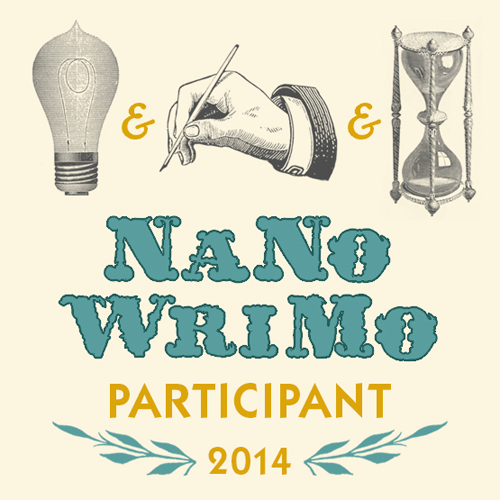 It’s National Novel Writing Month and for the first time, I am trying NaNoWriMo. This is pronounced na-noh-RY-moh.
It’s National Novel Writing Month and for the first time, I am trying NaNoWriMo. This is pronounced na-noh-RY-moh.
According to Wiki, NaNoWriMo is the brainchild of freelance writer Chris Baty who started the project in July 1999 with 21 participants. In 2000, NaNoWriMo was moved to November “to more fully take advantage of the miserable weather.”
I don’t know about “miserable” because I like writing when the snow is falling.
 Here’s how it works:
Here’s how it works:
Participants take on the challenge of writing 50,000 words of a new novel from November 1 to the deadline of 11:59 pm on November 30. To “win” you submit your work to some kind of “scrambler” which automatically counts your words. Even if you don’t hit the 50,000 words mark, you’re still successful because you have at least created a few scenes of a new book. And, as the old adage says, you can’t edit a blank page. So, if nothing else, this exercise will provide a starting point.
The focus is on completion, rather than perfection. This is hard for me, since my modus operandi is to edit as I go. But nothing ventured, nothing gained, so I’m giving it a shot.
I am still discovering new stuff on the NaNo website and, while I am off to a slow start, I remain motivated. My goal is to write 50,000 words of the next book in my “wedding” series. So far, my characters have names and they’re on an airplane, arguing about something. Not sure what.
I’ll report back next Tuesday. Wish me luck!
The post NaNoWriMo appeared first on Suzanne Stengl.
October 28, 2014
Fall Industry Workshop
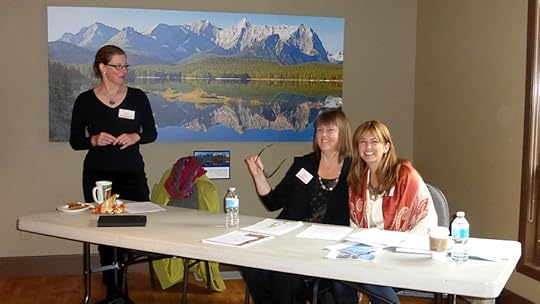
Moira Stelmack with Victoria Curran and Jane Porter
Last Saturday, the Calgary Association of the RWA held its annual Fall Industry Workshop at beautiful Redwood Meadows, Alberta. Our speakers were Jane Porter from Tule Publishing and Victoria Curran from Harlequin Heartwarming.

Brenda Sinclair, Ellen Jorgensen, Marlene Renee
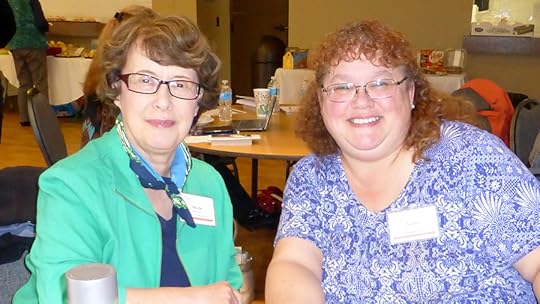
Sherile Reilly and Jessica L. Jackson

Win Day and Alyssa Linn Palmer
With the fireplace blazing, President Moira Stelmack interviewed Jane and Victoria, and fielded questions from attendees. We learned about what’s new in the publishing world and talked about publishing challenges and opportunities.
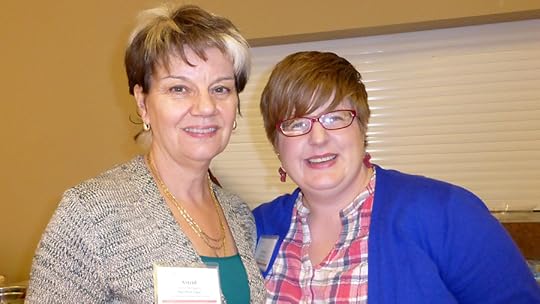
A.M. Westerling and Jade Buchanan
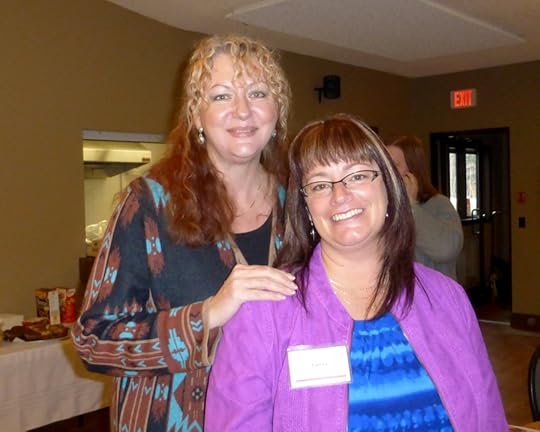
Kymber Morgan and Lawna Mackie

Roxy Boroughs and CJ Carmichael
After a potluck lunch, Jane Porter presented her “Writing Well, Selling Well” workshop with additional insights from Victoria Curran and CJ Carmichael.

Shelley Kassian and Jane Porter
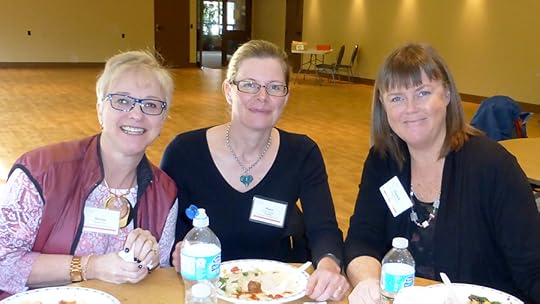
B.C. Deeks, Moira Stelmack, Victoria Curran
Next on the schedule, we had Manuscript Critiques. Members Jade Buchanan and Victoria Chatham read two-page manuscript samples to the audience, and then Victoria Curran and Jane Porter did their impromptu critiques. Victoria Curran assured us that this type of critique was more for entertainment value, and is not the usual process for critiquing a submission. Still, I think we all learned a lot, and we enjoyed each piece. Thank you to everyone who contributed a sample for discussion.

Alyssa Linn Palmer and Jennifer Howard

Suzanne Stengl and Victoria Chatham
With CARWA’s usual efficiency, the tables and chairs were soon put away and leftovers were packed up. Afterwards, a group of Carwackians (and one brave editor) headed over to the Powderhorn Saloon in Bragg Creek for debriefing and drinks.

B. C. Deeks, Victoria Curran, Alyssa Linn Palmer, Shelley Kassian, Kymber Morgan, Dara-Lee Snow, Jill Flanagan, Sherile Reilly, Roxy Boroughs
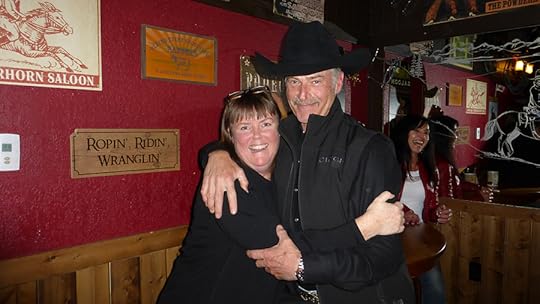
Victoria Curran and Cowboy at the Powderhorn Saloon
And a good time was had by all!
The post Fall Industry Workshop appeared first on Suzanne Stengl.
October 21, 2014
The Eleven Hour Bus Trip
It’s time for another story from my 2007 Ecuador trip. Last time, I told you about The Jungle. After that adventure, we rested up in Quito for two nights. Then we boarded the bus for Cuena—it was supposed to be an eight-hour trip.
For the rest of the Ecuador story, go here.
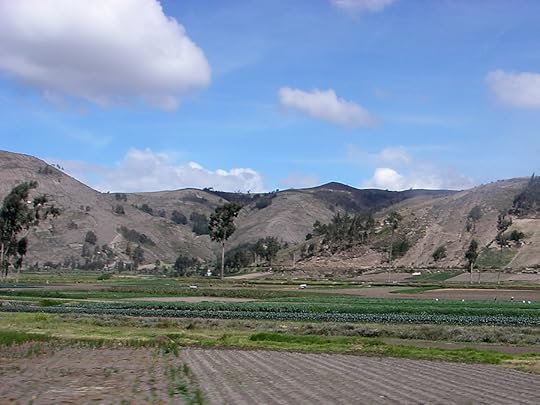
Dear family and friends,
We are safely and comfortably in Cuenca for a few days. On Tuesday, we left Quito on the bus at 10 in the morning.
The tickets cost $10 each and we pay an extra 25 cents each as we go through the turnstile, for terminal tax. We load our packs, they seem secure because the driver has a key for the compartment and closes it right after our packs go in. But we do not get a receipt. (We recently met an American couple here in Cuenca who had a problem with the ‘no receipt’, as one of their bags never arrived. Without a receipt, they had nothing to show the police, so they had to settle for $250 to replace their year’s worth of clothing, shoes, sleeping bags, etc. But we are lucky, our packs arrive.)
Once we get the packs loaded, we go to the bathroom. The toilets don’t have seats but they are clean, and toilet paper only costs 15 cents.
The bus leaves on time at 10 and as we are pulling out of the terminal, a young man walks through selling litre bottles of yogurt, followed by another guy selling bottles of water. Sort of like an omen that we will be here for a long time. Then the first sales presentation starts.
The place where the driver sits is separated from the rest of the bus. There is a glass divider and a door, and an orange curtain behind the glass divider so you can’t see where you are going. This might be intentional, so you cannot see where you are going on those narrow mountain passes. You probably don’t want to know. But for me this is a problem, because I can’t keep my eyes on the horizon. I am sitting by the window so I get a peripheral view, which is not as good as looking straight ahead.
On the glass divider there is advertising about how this bus “Sucre Express” has music, DVD, baño, and is safe and punctual. There is also a sketch in red lines of Jesus with a crown of thorns – with the red lines contrasting against the orange curtain. Sort of like, if you think You are suffering, consider how Jesus felt . . .
The sales presentation continues. I think the guy is selling ginseng. Costs $4.50 in stores, but for you, because he cares so much, it’s only $2.00 a bottle. He believes in it so much he would give it to you for free but he can’t. There is a magic demonstration where he adds “toxins” to a glass of pure water to represent the coffee, alcohol and fast foods that go into our bodies, and then he adds a magic pill and the brown water changes to clear. It might have been more effective if he had drank the water after, but he throws it out the window.
He lets people hold the bottles of pills. No obligation. And he points out the writing on the bottles, how this is a prestigious laboratory, how the bottles are hermetically sealed, etc. Then he collects the bottles back and – the most amazing part – some of the people purchase them.
An hour into the trip, Rolf has to pee. The door to the baño is locked so he goes to the front and knocks on that door. The driver has a helper who has the key. But the helper says that the baño is only for the señoras. Rolf disagrees and he gets to use the toilet. I use it too. Very tricky on these bumpy, winding roads. Of course, there is no water to wash your hands but I have my little bottle of alcohol cleanser. I can’t help it, I’m a nurse. I’m sure the locals think I am loco. Or is it locA?
At Latacunga, two ladies in red shirts and caps board, carrying Tupperware containers of helados for 50 cents each. Homemade ice cream on a stick wrapped in a baggie. I get coconut, which tastes very good and the cold helps with the nausea. It would be better if I could see straight ahead but that only gives me the orange curtain and the suffering Jesus.
New passengers have boarded, and now another guy does another sales spiel on ginseng. He competes with the scratchy music from the loud speakers. He finishes and makes a few sales.
We stop somewhere. Quien sabe? The driver says 15 minutos and disappears. I decide to use the bus stop’s bathroom.
Bathrooms in this country are a special experience. I carry my own toilet paper. Use some to wipe the toilet seat – this place has a toilet seat, and it is wet. These toilets do not flush but there is a barrel of dark water with a plastic jug floating in it. I think the idea is to dump water in the toilet to ‘flush’ it – which is why the seat was wet before. I only peed, so I don’t worry about it, and besides, I just don’t want to reach in that barrel. Of course there is no water to wash your hands, but I pour a good dose of alcohol on my palms and rub for 15 seconds.
Meanwhile Rolf is grabbing a bowl of soup at a restaurant, which has a clean bathroom (he later told me) and even running water. However, he was sick the next day, so who knows about the soup. It’s about 2 pm, and so far I have only eaten that ice cream so I buy a sealed little package of Ritz-like crackers. Which are good for the nausea. I return to the bus, since the 15 minutes is up. And I wonder where the driver is. The motor is still running.
I get a window open for air. We are the only turistas on this bus and the locals don’t like anything bordering on cool. I sit by the window and sip water and air. And watch out the window.
The median in the road has an overflowing barrel of trash. A lactating dog crosses the road to the barrel, puts her paws on the top of the barrel, and searches. She finds a neatly tied green garbage bag, removes it, and carries it down the median. Then she sits down with her lunch between her paws and rips open the bag. She finds a takeout Styrofoam tray which seems to have a good meal left because she is eating for a long time. Then the tray blows away along with the rest of the bag’s contents. The trip continues. There is a third sales presentation.
About 3:20, the bus pulls to the side of the road and the driver and his helper get out, followed by just about every male passenger, including Rolf. I hear someone say “peligroso” – dangerous. I get out too, with my daypack – never leave anything behind.
We stand on a cliff and look at the blocked road below. The men are dispersing, peeing on various bushes. Women are out of the bus too. Many wear the indigenous uniform – hat, frilly knee-length skirt, colourful shawls. One is knitting.
The decision is made to drive to the blockade. Everybody runs back to the bus with the same enthusiasm as if we are off to swim at the lake on a hot day.

At the bridge below, a large truck is placed crosswise on the road, with its front tires flat. The duals at the rear are okay. There is no traffic on the other side of the bridge, because another truck blocks the bridge on the other side of the pueblo. This is a small indigenous settlement forgotten by the government and the rest of Ecuador, and demanding some attention.
At this point, some guy comes through the bus selling banana chips. A good sales opportunity.
There are no police or military but the media is there, with two cameras. Rolf talks with one of the other passengers, a metizo (not Spanish, not indigenous, a mix). We meet a lady from a different bus, Susan, from Vancouver. She has actually worked with a Belgian volunteer project at this pueblo and she tells us about the poverty here. The children get fed once a day, at breakfast, some boiled gruel. She ate the same gruel, got sick and left, and now she is touring. The volunteer project was teaching English and Computers, if you can believe it. The place actually has a computer, except it doesn’t work. They teach concepts on a white board – another story.

Nothing happens for about an hour and a half – except the men are crawling all over the truck and seem to be enjoying the diversion. There is no leadership. Or at least no one is taking charge. There are several buses in the building line-up of traffic. They seem to be waiting for the police to arrive, maybe. They do try rocking the truck, with about 30 men pushing. But the tires don’t roll.
Eventually, some guy gets an idea. I see him go under the truck and he is pulling some lines. I was afraid they might be fuel lines, and that he was going to blow up the truck, but what do I know? I tend to get paranoid around crowds. But then Rolf figured out that the guy was disconnecting the brake lines. And now the truck, even with the flat front tires, can roll.
The indigenous who have been monitoring our progress, now start to place rocks in front of the tires. Rolf crawls under the truck, removes a rock and tosses it in the river. This makes the travellers happy. There is renewed effort to push the truck to the side. And, amazingly, all of this is happening without anyone in charge.
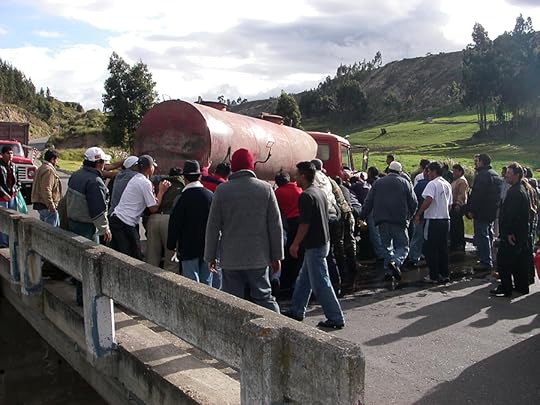
As soon as the truck is almost clear to move off the bridge, another vehicle starts to crowd forward – to be the first one across. However a bus at the front, needs to back up, just a bit, to allow room for the blocking truck to be moved. The people seem to figure this out, and then they are backing up vehicles.
Thirty men, including Rolf, are pushing the truck to the side, and then there is room to cross the bridge.
During this time, the indigenous are peaceful, throwing water and not rocks.
We get through the pueblo, to the next blockade. Our bus’s men pile out, move the next truck and we are on our way. It is about 5 o’clock, there is another hour or so of daylight. The scenery is pretty, if you like rolling green hills that make me think of Ireland. But the effect is somewhat marred by the roadside garbage, with the dogs rooting through it.
After dark, about 6:30, it is rainy and foggy, and I don’t get to see much of the Incredible Scenery. I do see, out my window, the muddy gravel road, and I hear the blare of horns as buses meet each other on said road.
And I feel about as sick as I have ever felt with nausea. At 9 pm, we arrive in Cuenca, find a very nice hotel, and I swear off buses for life.
Except I have to get on another one tomorrow. I’m not sure I can do it. I may be stuck in Cuenca forever.
s :o)
who now remembers that there is such a thing as Transderm V for motion sickness – but you can’t buy it in Ecuador.
The post The Eleven Hour Bus Trip appeared first on Suzanne Stengl.



